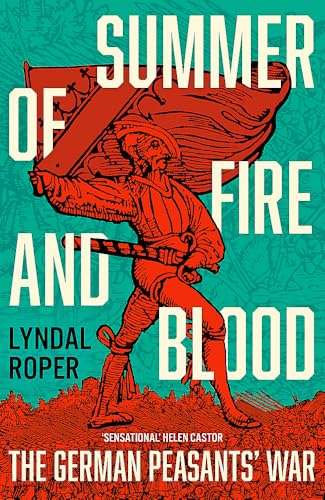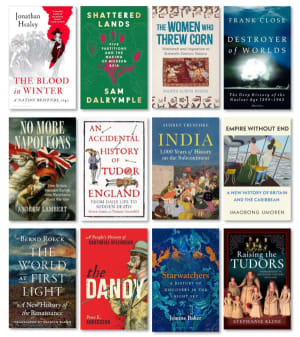If there are any English Literature students out there looking for a subject for their dissertation, may I suggest: “Why Harry Potter is an allegory of the Reformation with Harry Potter himself representing a German peasant in the Peasants’ Revolt.”?
Bear with me.
Imagine you are Harry Potter. You live with your aunt and uncle: an ordinary child leading an ordinary life. Your aunt and uncle protect you from danger but require servitude in return - washing the dishes, cooking breakfast, that sort of thing. This life is not particularly happy but it is all you have ever known.
However one day you discover that they have been keeping a truly astounding secret from you. There is another world adjacent to your own. A world of magic.
In this magical world almost anything is possible:
- Creating large quantities of food (including bread and fish) out of thin air.
- Healing the sick and curing crippling injuries.
- Immortality itself1
Even more remarkable, in this magical world you are in control. All that you need to do is read a special book - a spell book - and all these wondrous things will be yours.
Kept in the dark
Your aunt and uncle knew about this world, but they didn’t tell you because you are just a child. The secrets of this world, in their view, should be restricted to a select few.
The only reason that you found out was because a special man (the wizard Dumbledore) revealed himself to you with a magic letter that showed you the way.
Naturally you are furious. You have been controlled and manipulated for too long. Against their wishes you storm out of the house and join your fellow elect students at magic school.
An analogy theory
Whether or not J K Rowling was consciously or unconsciously writing about the Reformation and the peasants revolt we will never know2. But it is clear to me that:
- Uncle Vernon and Aunt Petunia represent the power of the secular and ecclesiastical lords respectively.
- Spell books in general represent the Bible.
- Albus Dumbledore is Jesus.
- Harry Potter and his classmates are the peasants.
It’s possible that a close reading of the Harry Potter corpus will reveal one or two inconsistencies in my thesis but to me the outline is clear.
What I would like to focus on for this book review is the moment Harry Potter realises he has been duped, when he realises there is another amazing, beautiful, fabulous world out there and he is part of that world. The axis of this world is magic and magic is the Word.
Seeing the light
I like to think of a German peasant having a moment of similar epiphany in 1524 when he3 has direct access to the Word of God for the first time: through the Bible in a language he understands.4
Lyndal Roper describes what happens next in Summer of Fire and Blood: The German Peasants’ War.
Every revolution must be nourished by dreams of a new world... people applied Reformation ideas they had heard to their own lives and experienced together what change could mean.
Lyndal Roper, Summer of Fire and Blood
Across parts of Germany, Austria and France hundreds of thousands of peasants decided that they had had enough and gathered together in large bands, targeting castles (if they weren’t too well defended) and monasteries, which they plundered and often burnt to the ground.
Polycausal
Why did they do it? Roper is no mono-causalist and lays out a variety of contributory factors: certainly there was a feeling that the burden laid on the peasants was too high and often arbitrarily increased. But ideas and religion were critical too, you need to be able to imagine a new world before you can fight for it.
Roper also cautions us against believing everything we read when it comes to the peasants' revolt - not least because almost all the peasants couldn’t write. Roper carefully parses the evidence we do have, and tries to reconstruct the peasant experience and outlook, as far as this is possible.
What did they really really want?
One famous (written down) expression of what the peasants wanted was “The Twelve Articles” which was a brilliant distillation of “hundreds of local complaints” down to a small number of concrete demands by the pamphleteer and furrier Sebastian Lotzer. Each demand was a paragraph of text, also containing a biblical justification.
In the modern internet age this is way too verbose, even if there are only 12 of them, so I have further distilled them below and added an emoji:
- ⛪ Villagers choose their own preachers.
- 💰 Preachers get paid directly from the villagers’ main tithe. No other tithes allowed!
- 🏄 Serfdom banned, all peasants free.
- 🐟 Everyone can go hunting and fishing.
- 🌳 Anyone can take wood from the forests.
- ⚒️ Compulsory labour to be reduced to previous more reasonable levels...
- 🥵 ... and you can’t just increase compulsory labour again later!
- 🧾 Farmland rents should be set at fair levels, especially where fields have low crop yields.
- 🤑 No more arbitrary fines.
- 🏞️ Commonlands which have been taken by nobles are to be returned to the commoners.
- ⚰️ No more inheritance tax.
- ✝️ All of these articles must be consistent with God’s word.
Non-lethal violence
One thing that surprised me about the revolt was how non-lethal it was. While humiliation of lords, abbots and monks was popular, murder and massacres were extremely rare. When one unusually violent peasant band did kill about 20 aristocratic prisoners in cold, or at least cooling blood, this was clearly exceptional.5
In many respects the revolt seemed to have a carnival atmosphere, and this was certainly the perspective of many of the clergy who resented them breaking in getting boozed up on the vast quantities of carefully hoarded monastic wine. But even so it is to me the lack of excess rather than the loss of control which is remarkable.
Oathmakers
Another interesting take-away for me was the central importance of the oath in feudal life, which was then subverted to hold together the peasant armies:
The glue that held the edifice of lordship together was the oath: peasants swore an oath of loyalty to their lord, and he promised them protection... The first step of revolt was therefore to break one’s feudal oath and to swear a new one to each other.
Lyndal Roper, Summer of Fire and Blood
A particularly effective oath breaker and re-maker was Thoms Muntzer, a charismatic radical preacher and one of the most provocative revolutionaries. He seemed to have been particularly effective at travelling from town to town, stirring up trouble (or spreading the truth, depending on your perspective) convincing his followers to swear oaths of brotherhood to each other, and then heading off to the next town.
When unreast started spreading in 1525 the towns containing Thomas Muntzer’s oath swearers were often the first ones to join the revolt, such was its psychological power.
Maybe the reason this seems surprising to me is because I have never sworn an oath in my life, with the exception of one to my cub scout leader when I was seven.6 Perhaps I should swear a few more and see what I can achieve, because as Roper describes:
The ideas of winter gave way to a period of action in early spring 1525 that was far more widespread and wide-ranging in its targets than anything that would be seen in western Europe before the French Revolution.
Lyndal Roper, Summer of Fire and Blood
Bloody defeat
Of course it was not to last. I don’t think it is a spoiler if I tell you that the peasants, despite their best efforts, were not able to resist cannon or mounted knights, and when the lords managed to get their act together and put together an army there was little that they could do. In the end the slaughter was immense with something like one hundred thousand peasants killed in a few months.
Was it worth it?
Did the peasants achieve anything? Not really, for themselves. Roper points out that in the near term their revolt hastened other changes such as the increasing power of the greater nobility at the expense of the knights. The monasteries too were struck a blow from which many never recovered. But it wasn’t for this that the peasants revolted.
However the peasants' ability to imagine their own freedom was an inspiration for later - more successful - revolutionaries. Roper notes that “Karl Marx and Friedrich Engels themselves developed their theories of revolution and progress by studying it” and “the event became a primary battleground for arguments between right and left, and a test case for the study of revolution in all periods.”
In fact the book’s concluding chapter on the legacy and historiography of the peasants revolt was for me one of the most interesting in the book.
Style guide
Summer of Fire and Blood is, despite the grisly title, a pleasant book to read. It brings out both the story of the revolt itself and weaves in descriptions of life at the time throughout the narrative. There are also quite a few nice images of peasant life, which I appreciated!
Despite the broad scope of the book it never becomes overwhelming.
Anything not to like?
My only criticism is fairly minor, which is that while this was an incredibly exciting, transformative time for the many peasants taking part, that excitement and emotional fever never really passed on to me as a reader.
Perhaps this is Roper’s impeccable academic credentials that prevent her from getting called away - but I would have liked to feel a little bit more what it was like to be a revolting peasant in the heady summer of 1525.
Conclusion
The dramatic story of the archetypal peasant revolt that changed the world or changed nothing, according to your perspective. If the revolt has passed you by until now, I can recommend Summer of Fire and Blood: The German Peasants’ War. While it won't kindle your own revolutionary summer you are unlikely to be discontented.
Subject to certain sacrifices, such as the fracturing of your soul into tiny pieces, and your nose dropping off. ↩︎
Unless she replies to my email. ↩︎
This revolt is mostly about blokes. ↩︎
You could accuse me of anachronistic thinking here but I would like to frame it instead as an act of imaginative empathy :-). ↩︎
This became an excuse to kill thousands and thousands of peasants in return, often far more brutally. ↩︎
My wife pointed out that there was one more oath that I seemed to have forgotten but I was able to counter this with the argument that it was actually a vow and I hadn’t forgotten at all. ↩︎
Book details
(back to top)- Title -
Summer of Fire and Blood : The German Peasants' War
- Author -
Lyndal Roper
- Publication date -
February 2025
- Publisher -
Basic Books
- Pages -
544
- ISBN 13 -
9781399818025
- Podcast episode -
Future Discontinuous: What can we learn from the Peasants‘ War of 1525 Lyndal Roper?
- Amazon UK -
- Amazon US -



